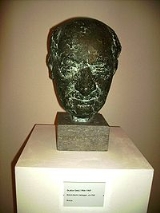
Martin Heidegger
Martin Heidegger was a German philosopher.
Sourced
- Transcendence constitutes selfhood.
- Essence of Ground (1929)
- Warum ist überhaupt Seiendes und nicht vielmehr Nichts? Das ist die Frage.
- Why is there Being at all, and not much rather Nothing? That is the question.
- What is Metaphysics? (1929)
- What is peddled about nowadays as philosophy, especially that of N.S., but has nothing to do with the inner truth and greatness of that movement [namely the encounter between global technology and modern humanity] is nothing but fishing in that troubled sea of values and totalities.
- Introduction to Metaphysics (1953) — a publication of lectures of 1935.
- Those in the crossing must in the end know what is mistaken by all urging for intelligibility: that every thinking of being, all philosophy, can never be confirmed by "facts," ie, by beings. Making itself intelligible is suicide for philosophy. Those who idolize "facts" never notice that their idols only shine in a borrowed light. They are also meant not to notice this; for thereupon they would have to be at a loss and therefore useless. But idolizers and idols are used wherever gods are in flight and so announce their nearness.
- Contributions to Philosophy (From Enowning) [Beitrage Zur Philosophie (Vom Ereignis)], notes of 1936 - 1938, as translated by Parvis Emad and Kenneth Maly (1989)
- The human body is essentially something other than an animal organism.
- Letter on Humanism (1947)
- The human being is not the lord of beings, but the shepherd of Being.
- Letter on Humanism (1947)
- Language is the house of the truth of Being.
- Letter on Humanism (1947)
- Agriculture is now a motorized food industry, the same thing in its essence as the production of corpses in the gas chambers and the extermination camps, the same thing as blockades and the reduction of countries to famine, the same thing as the manufacture of hydrogen bombs.
- Four Lectures on Technology (1949)
- Das Bedenklichste in unserer bedenklichen Zeit ist, dass wir noch nicht denken.
- The most thought-provoking thing in our thought-provoking time is that we are still not thinking.
- What is Called Thinking? [Was heisst Denken?] (1951 - 1952), as translated by Fred D. Wieck and J. Glenn Gray (1968)
- Everywhere we remain unfree and chained to technology, whether we passionately affirm or deny it. But we are delivered over to it in the worst possible way when we regard it as something neutral; for this conception of it, to which today we particularly like to do homage, makes us utterly blind to the essence of technology.
- The Question Concerning Technology (1954)
- The Geschick of being: a child that plays... Why does it play, the great child of the world-play Heraclitus brought into view in the aiôn? It plays, because it plays. The "because" withers away in the play. The play is without "why." It plays since it plays. It simply remains a play: the most elevated and the most profound. But this "simply" is everything, the one, the only... The question remains whether and how we, hearing the movements of this play, play along and accommodate ourselves to the play.
- The Principle of Reason (1955-1956) as translated by Reginald Lilly (1991)
- Philosophy will not be able to effect an immediate transformation of the present condition of the world. This is not only true of philosophy, but of all merely human thought and endeavor. Only a god can save us. The sole possibility that is left for us is to prepare a sort of readiness, through thinking and poeticizing, for the appearance of the god or for the absence of the god in the time of foundering Untergang for in the face of the god who is absent, we founder. Only a God Can Save Us.
- Interview (23 September 1966) , published posthumously in Der Spiegel (31 May 1976}, as translated by Maria P. Alter and John D. Caputo in The Heidegger Controversy : A Critical Reader (1991), edited by Richard Wolin.
Being and Time (1927)
- The possible ranks higher than the actual.
- Introduction
- Everyone is the other, and no one is himself. The they, which supplies the answer to the who of everyday Da-sein, is the nobody to whom every Da-sein has always already surrendered itself, in its being-among-one-another.
- Stambaugh translation
- The domination of the public way in which things have been interpreted has already decided upon even the possibilities of being attuned, that is, about the basic way in which Da-sein lets itself be affected by the world. The they prescribes that attunement, it determines what and how one "sees."
- Stambaugh translation
- In order to remain silent Da-sein must have something to say.
- Stambaugh translation
- Nevertheless, the ultimate business of philosophy is to preserve the force of the most elemental words in which Dasein expresses itself, and to keep the common understanding from levelling them off to that unintelligibility which functions in turn as a source of pseudo-problems.
- Macquarrie & Robinson translation
- Being is only Being for Dasein
- Macquarrie & Robinson translation
- Death is the possibility of the absolute impossibility of Dasein.
- Macquarrie & Robinson translation
